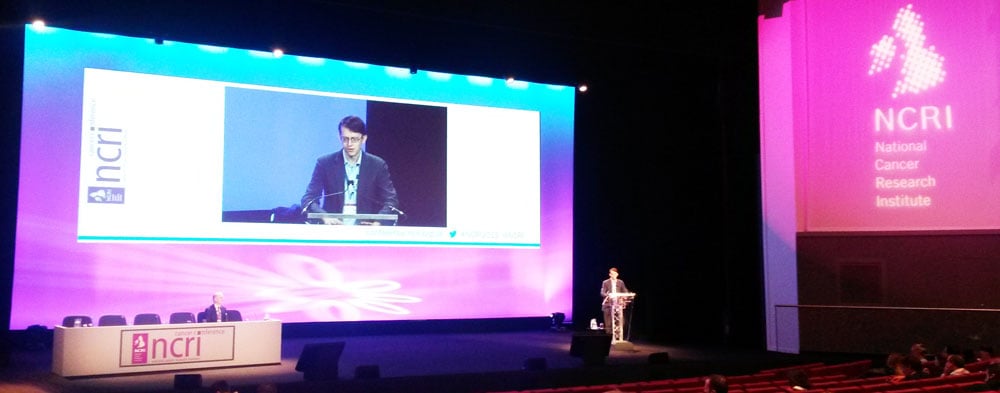We’ve made major progress tailoring treatments to genetic sub-types of breast cancer – but the next big challenge will be to drive up survival rates for triple-negative tumours, and that’s going to need the targeting of lots of different genes.
That was the message yesterday from Dr Nicholas Turner, Team Leader at The Institute of Cancer Research, London, and an Honorary Consultant at The Royal Marsden, in his talk at the NCRI conference in Liverpool.
Dr Turner described the substantial progress that researchers have made in getting new targeted breast cancer treatments into clinical trials for certain types of breast cancer. But he had a strong message about the need for new models of clinical research for patients with the triple-negative form of breast cancer, which has proved particularly tough to treat.
Breast cancers have traditionally been categorised into sub-types based on whether the cancer cells express certain hormone receptors such as human epidermal growth factor receptor 2 (HER2) and oestrogen receptor (ER). This information can be used to prescribe treatments which target these receptors on the tumours. A well-known example is the drug Herceptin, which is used on tumour cells which express a lot of HER2 protein. Cells which have none of these receptors are classed as triple-negative breast cancers, and patients with this form of the disease have the worst outcomes.
In more recent years, researchers have moved beyond this classification system, to also classify tumours based on their genetic cause, and to develop targeted treatments against the specific cancer causing genetic alterations seen in an individual tumour.
Targeted treatments
Dr Turner described a selection of the more common mutations found in breast cancers and recent progress in patients using drugs targeting these specific mutation. One example he described was a mutation found in around 40% breast cancers, in a gene coding for an important subunit of a protein called PI3K. Clinical trials of drugs which inhibit this protein are showing positive early results in patients with breast cancer. Dr Turner showed other areas of research where we are making good progress in getting new therapeutics into clinical trials.
Bringing targeted treatments to triple-negative breast cancer
But he also warned that there were only a few of these really common mutations in breast tumours, and that further progress was going to rely on targeting of genes implicated in only a few per cent of cancers.
Research into the genetic profiles of triple-negative tumours has identified several common genetic alterations which are common in triple negative tumours, for example mutations in the p53 gene and amplification of another known cancer causing gene, MYC. However, as yet we haven’t been able to develop drugs which target either of these genes or their products.
What I found most interesting was that Dr Turner explained that the current approach we use for clinical trials doesn’t work well enough when it comes to triple-negative breast cancers. He said we need to be using sequencing technologies to screen for all cancer-causing mutations, identifying the most relevant mutations in individual cancers, and directing patients into clinical trials that specifically target these mutations.
It’s worth bearing in mind that so many women get breast cancer each year (around 50,000) that a mutation implicated in 2% of patients is still found in 1,000 people a year – more than the total number affected by many cancer types.
Dr Turner urged researchers to use the experience of stratifying and treating patients according to the more common subtypes of cancer, and apply this knowledge to the rarer causes of breast cancer.
By incorporating this strategy into our trial design, we can identify the most appropriate treatments for patients, and hopefully make progress into this most difficult breast cancer subtype.
comments powered by